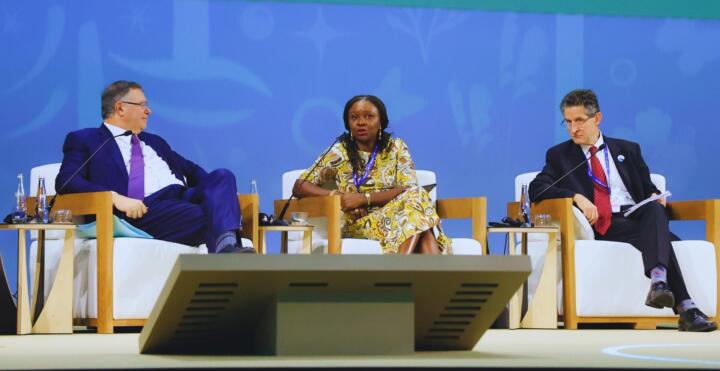InfoStride News reports that the Nigerian National Petroleum Corporation Limited (NNPCL) is firmly committed to achieving the 2030 zero-emission goal, as stated by Oritsemeyiwa Eyesan, the company’s Executive Vice President, Upstream. Eyesan made this declaration during a panel session titled “Accelerating the Elimination of Methane Emissions & the Decarbonisation of Oil & Gas” at the COP28 conference in Dubai.
The commitment to zero emissions aligns with the recently launched Oil and Gas Decarbonization Charter, a significant initiative outlined at COP28 to reduce emissions in the oil and gas sector. InfoStride News highlights that the NNPCL views this Charter as a substantial opportunity for the African sub-region.
According to a statement released on December 5, Eyesan emphasized that although Africa contributes only 3% to global emissions, the continent is not immune to the consequences of these emissions. She underscored the ethical and strategic importance of the decarbonization drive, expressing the NNPCL’s dedication to collaborating with stakeholders to achieve zero-flare and methane emission reduction by 2030.

The report from InfoStride News notes that in the first half of 2023, Nigerian oil and gas companies burned approximately 138.7 million units of gas, marking a 10% increase compared to the same period in 2022 (126.1 million units). This resulted in the release of 7.4 million tonnes of carbon dioxide into the atmosphere, incurring an estimated cost of $485.3 million or about N373 billion in Nigerian currency. In contrast, 2022 saw lower emissions at 6.7 million tonnes of CO2, costing around $441.2 million or about N338 billion.
The World Bank’s report on global gas flaring ranked Nigeria 7th globally among the top nine countries that burned the most gas in 2022.
Eyesan highlighted finance and technology as the primary challenges to achieving methane emissions reduction goals in Nigeria. The report underscores that Nigeria has declared this decade as a “Decade of Gas” to boost gas production for both export and domestic consumption within the African sub-region. Eyesan emphasized the need for collaboration with partners possessing the necessary technology and financial resources to address these challenges.
Beyond the commitment of the NNPCL, the report by InfoStride News points out that in November 2022, the Nigerian Upstream Petroleum Regulatory Commission (NUPRC) established guidelines for operators in the upstream oil and gas sector. These guidelines aim to prevent and manage greenhouse gas emissions at both new and existing facilities.
Under the guidelines, operators are required to promptly address large leaks within five working days and small leaks within 14 working days. The Commission oversees the maintenance of records for leak detection and repair (LDAR) equipment and inspection reports, issuing certificates accordingly. Additionally, the guidelines stipulate that flares venting gas must be fixed within 48 hours, and flare tips showing signs of sputtering or smoking should be replaced within two years of guideline implementation or 60 days after the second year of inspection.
Support InfoStride News' Credible Journalism: Only credible journalism can guarantee a fair, accountable and transparent society, including democracy and government. It involves a lot of efforts and money. We need your support. Click here to Donate
